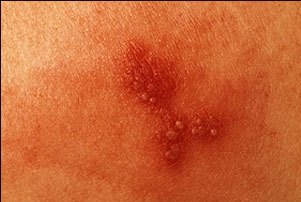Herpes - oral
Contents
When to Contact a Medical Professional
Oral herpes is an infection of the lips, mouth, or gums due to the herpes simplex virus. It causes small, painful blisters commonly called cold sores or fever blisters. Oral herpes is also called herpes labialis.

This close-up view of an early herpes outbreak shows small, grouped blisters and a lot of redness.
Causes
Oral herpes is a common infection of the mouth area. It is caused by the herpes simplex virus type 1 (HSV-1). Most people in the United States are infected with this virus by age 20.
After the first infection, the virus goes to sleep (becomes dormant) in the nerve tissues in the face. Sometimes, the virus later "wakes up" (reactivates), causing cold sores.
Herpes virus type 2 (HSV-2) usually causes genital herpes. However, sometimes HSV-2 is spread to the mouth during oral sex, causing oral herpes.
Herpes viruses spread easily. You can catch this virus if you:
- Have intimate or personal contact with someone who is infected
- Touch something that is infected with the herpes virus, such as infected razors, towels, dishes, and other shared items
Parents may spread the virus to their children during regular daily activities.
Symptoms
Some people get mouth ulcers when they first come into contact with HSV-1 virus. Others have no symptoms. Symptoms usually occur in kids between 1 and 5 years old.
Symptoms may be mild or severe.
They usually appear within 1-3 weeks after you come into contact with the virus. They may last up to 3 weeks.
Warning symptoms include:
- Itching of the lips or skin around mouth
- Burning near the lips or mouth area
- Tingling near the lips or mouth area
Before blisters appear, you may have:
- Swollen glands
- Painful swallowing
Blisters or a rash may form on your:
- Gums
- Lips
- Mouth
- Throat
Many blisters are called an "outbreak." You may have:
- Red blisters that break open and leak
- Small blisters filled with clear yellowish fluid
- Several smaller blisters may grow together into a large blister
- As the blister heals, it gets yellow and crusty, eventually turning into pink skin
Symptoms may be triggered by:
- Menstruation or hormone changes
- Being out in the sun
- Fever
- Stress
If the symptoms return later, they are usually more mild.
Exams and Tests
Your doctor or nurse can diagnose oral herpes by looking at your mouth area. Sometimes, a sample of the sore is taken and sent to a laboratory for closer examination. Tests may include:
- Viral culture
- Viral DNA test
- Tzanck test to check for HSV
Treatment
Symptoms may go away on their own without treatment in 1 to 2 weeks.
Your health care provider can prescribe medicines to fight the virus. This is called antiviral medicine. It can help reduce pain and make your symptoms go away sooner. Medicines used to treat mouth sores include:
- Acyclovir
- Famciclovir
- Valacyclovir
These medicines work best if you take them when you have warning signs of a mouth sore, before any blisters develop. If you get mouth sores frequently, you may need to take these medicines all the time.
Antiviral skin creams may also be used. However, they are expensive and often only shorten the outbreak by a few hours to a day.
The following steps can also help make you feel better:
- Apply ice or a warm washcloth to the sores to help ease pain.
- Wash the blister gently with germ-fighting (antiseptic) soap and water. This helps prevent spreading the virus to other body areas.
- Avoid hot beverages, spicy and salty foods, and citrus.
- Gargle with cool water or eat popsicles.
- Rinse with salt water.
- Take a pain reliever such as acetaminophen (Tylenol).
Outlook (Prognosis)
Oral herpes usually goes away by itself in 1 to 2 weeks. However, it may come back.
Herpes infection may be severe and dangerous if:
- It occurs in or near the eye
- You have a weakened immune system due to certain diseases and medications
Possible Complications
Herpes infection of the eye is a leading cause of blindness in the United States. It causes scarring of the cornea.
Other complications of oral herpes may include:
- Return of mouth sores and blisters
- Spread of the virus to other skin areas
- Bacterial skin infection
- Widespread body infection, which may be life threatening in people who have a weakened immune system due to atopic dermatitis, cancer, or HIV infection
When to Contact a Medical Professional
Call for an appointment with your health care provider if you have :
- Symptoms that are severe or that don't go away after 2 weeks
- Sores or blisters near your eyes
- Herpes symptoms and a weakened immune system due to certain diseases or medicines
Prevention
Here are some tips to prevent mouth sores:
- Apply sunblock or lip balm containing zinc oxide to your lips before you go outside.
- A moisturizing balm to prevent the lips from becoming too dry may also help.
- Avoid direct contact with herpes sores.
- Wash items such as towels and linens in boiling hot water after each use.
- Do not share utensils, straws, glasses, or other items if someone has oral herpes.
Do not have oral sex if you have oral herpes, especially if you have blisters. You can spread the virus to the genitals. Both oral and genital herpes viruses can sometimes be spread even when you do not have mouth sores or blisters.
Source: http://www.nlm.nih.gov/medlineplus/ency/article/000606.htm

